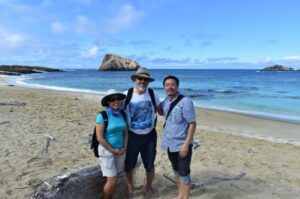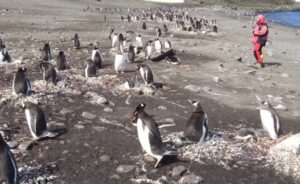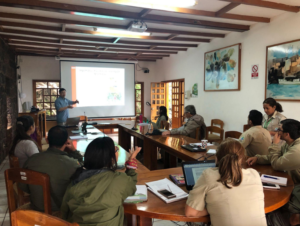Historical Information: The Galapagos Working Group
The Galapagos Science Center (GSC) was founded in 2011 as a hub for scientific research projects to benefit the Galapagos and the world of science. The GSC is the first and only academic research center on the Galapagos archipelago. In response to opportunities offered by the GSC, a working group of NC State faculty interested in Galapagos research, sustainability, training and education formed to pursue projects of interest on the Islands.
About
This page serves as a repository of important historical content, including news, research spotlights, and more, related to the Galapagos Working Group. For current information, please see the main Galapagos Working Group page.
Past Meetings
Galapagos Working Group September 2022 Meeting
The Roundtable met on Thursday, September 15, 2022 for its inaugural meeting. Special guests included:
- Amanda Thompson, Co-Director of the Center for Galapagos Studies at UNC and Co-Director of the GSC
- Diego Riveros-Iregui, Co-Director of the Center for Galapagos Studies at UNC and Co-Director of the GSC
- Daniela Cajiao, visiting scholar with Roundtable member Dr. Yu-Fai Leung
The session was recorded and is included here. (Access code: eWMR*8Pb)
Galapagos Working Group January 2022 Meeting
The first Galapagos Working Group (GWG) meeting was held on January 20, 2022, and featured guest presenters Amanda Thompson, Corbin Jones, Xiaoming Liu and Adrian Marchetti with UNC’s Galapagos Initiative. Our guests provided an overview of the Initiative, along with a closer look at the projects that each of them is currently working on.
A lively discussion and Q & A session followed the presentations, capping a well-received forum. The session was recorded and is included here (Access Password: Q@F2uC?%), along with Thompson’s slides.
Past Research Spotlights
Research Spotlight: Dr. Yu-Fai Leung
Dr. Yu-Fai Leung is a Professor in the College of Natural Resources and Director of Graduate Programs in the Department of Parks, Recreation and Tourism Management. Dr. Leung´s research focuses on the advancement of the science and practice of sustainable visitor (recreation and tourism) management in parks, protected areas, and wild places globally. Dr. Leung is particularly interested in developing and evaluating visitor use and impact indicators, monitoring protocols, and management strategies. In addition to his work in the Galapagos, Dr. Leung is active in research, education and training programs on several continents, including Antarctica.

Dr. Leung is an active participant in the International Union for Conservation of Nature (IUCN). He is also a member of the IUCN World Commission on Protected Areas and coordinates a biodiversity working group under the Tourism and Protected Areas Specialist Group. He serves on the Standing Committee on the Humanities and Social Sciences (SC-HASS) of the Scientific Committee on Antarctic Research (SCAR), co-leading the Tourism Action Group. Dr. Leung also served as the Chief Editor for the IUCN Best Practice Guidelines on sustainable tourism in protected areas.

When asked how he began working with the Universidad San Francisco de Quito (USFQ) on concerns relevant to the Galapagos Islands, Dr. Leung shared that his work on sustainable tourism and visitor management in international protected areas provided him with opportunities to interact with academic and professional colleagues around the world throughout the year.
He met with USFQ researchers at the 2016 IUCN World Conservation Congress in Hawaii, where they engaged in an informal discussion on Galapagos’ tourism issues, monitoring needs and management practices. That initial exchange, along with the Best Practice Guidelines he was developing for IUCN, led to his invitation to collaborate with his USFQ colleagues to evaluate and enhance the tourist use and impact monitoring program for the Galapagos National Park.

Regarding what he’s learned in his work at USFQ about implications for local wildlife/ecosystems, Dr. Leung explained that tourism and local recreation are a key human activity in the Galapagos that have both positive and negative impacts on the wildlife and ecosystems. He added that having learned a lot about the complexities of tourism-conservation connections in the Galapagos, he has come to appreciate the value and limits of monitoring and science in shaping tourism and visitor management strategies and practices.
As for the future of his work, Dr. Leung is hopeful that with better understanding of tourism and recreation impacts, timely monitoring data, and new conservation policies and actions, tourism and visitor use in the Galapagos will continue on a more sustainable path in the post-COVID era.
For more information about Dr. Leung and his background, teaching, research and service, please visit https://go.ncsu.edu/leung.
A Snapshot of Greg Lewbart’s Work with GSC
NC State’s Dr. Greg Lewbart, Professor of Aquatic, Wildlife, and Zoological Medicine in the Department of Clinical Sciences, joined NC State’s College of Veterinary Medicine in 1993. Dr. Lewbart is also an adjunct professor at UNC-Chapel Hill’s Gillings School of Global Health, and over the course of 21 trips throughout the past decade to the Galapagos, has participated in several research and health assessments through his affiliation with UNC-Chapel Hill and Universidad San Francisco de Quito.
As part of a broader international team of researchers, Lewbart has played a key role in the task of establishing baseline health parameters for the archipelago’s wildlife. His CVM colleagues, Dr. Diane Deresienski, Dr. Shelly Vaden, and Medical Support Technician Patty Secoura, are assisting with this work, recently bringing CVM endoscopy equipment to perform Dr. Lewbart’s novel sample collection in sea turtles for studying microplastics.
Read more about Dr. Lewbart’s research efforts below.
The Giant Tortoise
After being unable to travel to the archipelago as planned last year due to the COVID-19 pandemic, Lewbart advised and lent guidance from afar as the GSC collaborated with frequent partner the Galapagos National Park (GNP) to conduct health assessments of 30 juvenile giant tortoises. The objective of these assessments was to determine if the animals were healthy enough to both survive and prosper in the wild as part of critical repatriation efforts. These giant tortoises are currently recognized as a vulnerable species, with numbers decreasing from 250,000 to 3,000 in the 1970s. According to Lewbart, this decline was largely due to human exploitation. Today, with the help of the national park’s breeding center, there are 6,700 giant tortoises on San Cristobal island. The tortoise health assessments would not have been possible without the GSC.
Read more about this story, and watch a video from the GSC about tortoise health assessments.
The Galapagos Sea Lion
In June of 2021, Lewbart traveled to the GSC to conduct key research on the Galapagos sea lion. He noticed that sea lions often needed life-sustaining blood transfusions after injuries; however, it was previously unknown whether the animal could receive blood from same species donors. He, along with a team from the GSC and GNP, lead efforts to catch over 20 sea lions, take small blood samples, and conduct cross-matches. He found no clotting or other adverse reactions, discovering that sea lions could undergo health-promoting and potentially life-saving blood transfusions.
The Green Sea Turtle and the Española Nazca Booby
During his trip in June of 2021, Lewbart also conducted research on the green sea turtle and the Española Nazca Booby. First, he and his team sought to determine if, and what type of, microplastics exist in the feces of green sea turtles. For this analysis, a total of fifty sea turtles were captured in the Galapagos as well as in the surrounding waters of mainland Ecuador in order to provide a comparison of the scale of microplastics.
At the tail end of his trip, Lewbart visited Española Island to conduct health assessments on the Española Nazca booby. He and his team captured and obtained samples from 108 animals, with samples coming from two strategically selected locations – one near tourists and one in a remote location – in order to measure stress levels and better assess how tourism may or may not be impacting the species’ health.
Read more about Lewbart’s recent work with the GSC.
The Pink Land Iguana – More to Come!
Prior to returning from his most recent research visit to the GSC, Lewbart attended and participated in a workshop focused on conserving the pink land iguana. View the workshop agenda here.
Read more about the work of Dr. Lewbart and team here.